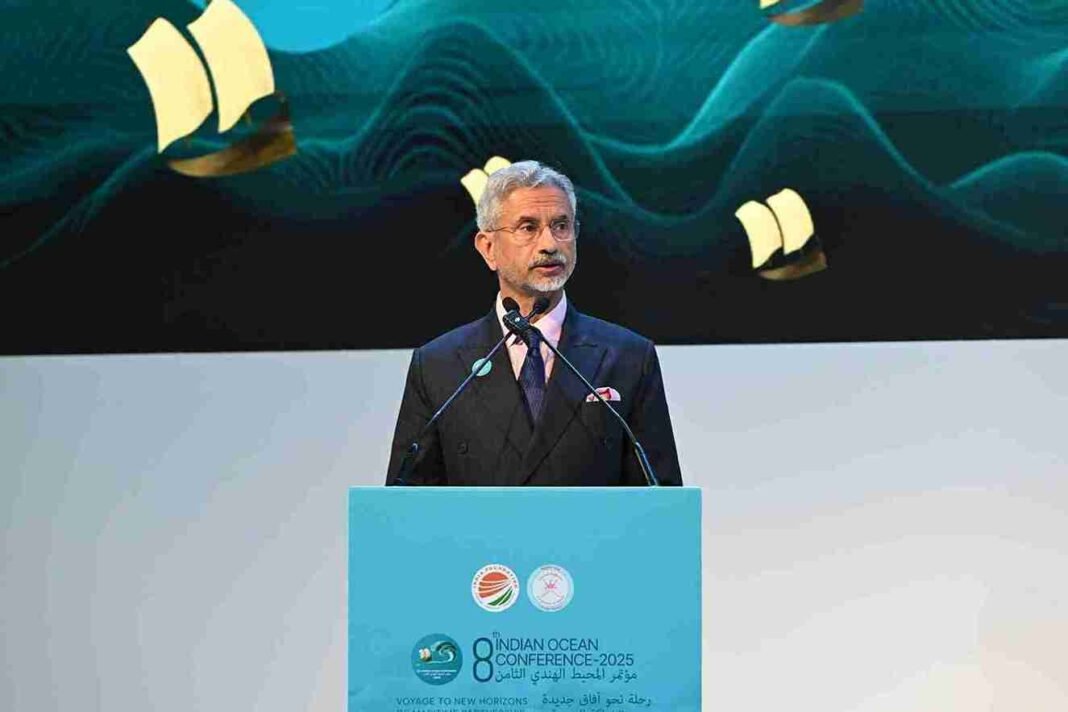In a keynote address at the 8th Indian Ocean Conference on February 16, 2025, in Muscat, External Affairs Minister (EAM) of India Dr. S. Jaishankar emphasized the importance of maritime partnerships in navigating the complexities of the Indian Ocean region.
The conference, hosted by the Government of Oman and organized by India Foundation and RSIS, gathered leaders and experts to discuss the evolving dynamics of the Indian Ocean.
Global Challenges:
Dr. Jaishankar opened his address by acknowledging the significant changes in global affairs, particularly in the Indian Ocean region, which he described as a “global lifeline.” He noted that the region’s production, consumption, and connectivity are crucial to the functioning of the world economy.
The EAM highlighted the ongoing conflicts in the Middle East and the Indo-Pacific, which have maritime implications that affect global shipping and economic stability.
Regional Challenges and Opportunities:
The EAM pointed out that while each Indian Ocean nation faces unique challenges, there are common trends that require collective action. Many countries in the region are grappling with developmental issues, resource constraints, and economic headwinds.
He stressed the need for transparent and consultative connectivity initiatives to rebuild the region after years of colonial disruption. Additionally, he raised concerns about illegal trafficking and terrorism, emphasizing the maritime implications of these challenges.
India’s Role in Maritime Security:
EAM Dr. Jaishankar outlined India’s proactive approach to addressing these challenges through various initiatives:
- Economic Stabilization: India has played a crucial role in stabilizing economies under stress, notably providing a financial package of USD 4 billion to Sri Lanka during its economic crisis.
- Connectivity Initiatives: The EAM highlighted key projects such as the India-Middle East-Europe Economic Corridor (IMEC) and the India-Myanmar-Thailand Trilateral Highway (IMTT), which aim to enhance regional connectivity.
- Disaster Response: India has increasingly acted as a first responder in the Indian Ocean region, assisting countries affected by natural disasters and conflicts.
- Plurilateral Cooperation: The EAM emphasized the importance of institutional responses to disasters, citing the Quad initiative and the ReCAAP center in Singapore as examples of collaborative efforts to combat piracy and enhance maritime security.
- Common Operating Picture: India is working to establish a shared maritime operating picture through initiatives like the International Fusion Centre, which aims to improve maritime traffic safety.
- Naval Deployment: In response to rising threats, India has deployed naval forces in the Northern Arabian Sea and Gulf of Aden to enhance maritime safety and security.
- Capacity Building: India is committed to training and equipping the navies and coast guards of various countries, fostering regional maritime capabilities.
- Digital Communication: Recognizing the importance of secure communication, India is participating in consortiums to enhance digital security in the maritime domain.
- Global Engagement: The EAM noted the increasing involvement of both resident and non-resident powers in the Indo-Pacific, highlighting India’s role in harmonizing interests while respecting international law.
- Institution-Building: India is actively involved in various regional organizations, including the Indian Ocean Rim Association (IORA) and the Indian Ocean Naval Symposium (IONS), to foster collaboration and dialogue.
A Unified Approach to Maritime Challenges
In closing, Dr. Jaishankar called for a coordinated approach among Indian Ocean nations, emphasizing the need for unity despite diverse histories and cultures. He expressed confidence that by working together, countries in the region can achieve stability, security, and shared aspirations. The EAM reaffirmed India’s commitment to leading these efforts, stating, “India will be in the forefront of these endeavours.”
The conference serves as a platform for dialogue and collaboration, aiming to strengthen maritime partnerships and address the pressing challenges facing the Indian Ocean region. As nations navigate the complexities of the modern world, the call for a united maritime front has never been more critical.








